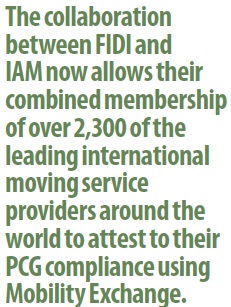In June of 2018, the IAM and FIDI Global Alliance made a joint announcement that it had entered into a Memorandum of Understanding (MoU) on the use of the FIDI Professional Cooperation Guidelines (PCGs) (see page 19 of The Mover, August 2018). But what exactly does this mean and what are the benefits to the industry? Ray DaSilva from IAM explains.
While there are a number of global networks under common control and ownership as well as a growing number of regional and global alliances, the international moving industry is still primarily made up of small- to medium-sized entrepreneurial companies around the world that collaborate on an ad hoc, non-contractual basis to deliver a seamless, end-to-end service to their customers.
The system works remarkably well and has been a key strength of the industry for many decades. We also recognize that some of the biggest risks that industry members face are related to this system, including the risk of payment default or delay related to dispute resolution. Disputes may occur between trading partners when service offerings and expectations are not clearly defined between the parties.
The Professional Cooperation Guidelines (PCG)
 Industry associations such as the FIDI Global Alliance (FIDI) and the International Association of Movers (IAM) exist in part to facilitate cooperation and trade between their members. FIDI is recognized as an industry pioneer for its initiatives which address quality standards, training and compliance amongst its members. The IAM recently launched its Mobility Exchange which allows its members and industry service providers to work together towards a vision of a universal directory accessible by industry professionals which catalogues capability, membership, quality, licensing and compliance qualifications.
Industry associations such as the FIDI Global Alliance (FIDI) and the International Association of Movers (IAM) exist in part to facilitate cooperation and trade between their members. FIDI is recognized as an industry pioneer for its initiatives which address quality standards, training and compliance amongst its members. The IAM recently launched its Mobility Exchange which allows its members and industry service providers to work together towards a vision of a universal directory accessible by industry professionals which catalogues capability, membership, quality, licensing and compliance qualifications.
Beyond the utility of the directory functionalities, which helps to connect industry partners and facilitate trade, Mobility Exchange has created a documentation and review system called IAMX Validation. This allows industry members to claim their listing and use their secure access to edit their company profile to ensure that their listing is accurate, current and complete. In addition, the validation system provides a facility for members to scan and upload documentation which supports each of the qualifications and years in service. The system tracks expiration dates for each qualification so that non-current qualifications are easily identified in the company profile.
The collaboration between FIDI and IAM now allows their combined membership of over 2,300 of the leading international moving service providers around the world to attest to their PCG compliance using Mobility Exchange.
Benefits to the industry
While cooperation and collaboration between industry associations is well established, we should not overlook the significance of this step taken by FIDI and IAM to carefully weigh the benefits of collaborative leverage for the industry as a whole rather than resort to the safety of protecting competitive advantage, which can be the norm. Both FIDI and IAM bring something to this equation and in this case the increase in benefits to the industry and its customers as each member adopts the PCG is not linear – it is exponential.
This foundation will allow the use of these standards to be embedded into industry training programmes and quality frameworks. The dispute resolution systems operated by both FIDI and the IAM will become standardised. The resulting reduction in friction will enhance efficiency and improve customer service.
Benefits to the customer
Customers that choose a PCG Compliant moving company will have an assurance that service commitments made by the booking company will be carried out during each phase of the international move process according to the standards set out in the PCG.
Just the first step
This is a huge step forward, but the opportunity to use this model to explore the benefits of standardization and collaborative leverage for the benefit of the industry and our customers is the real prize.
Click here to see the next Editor's Pick.